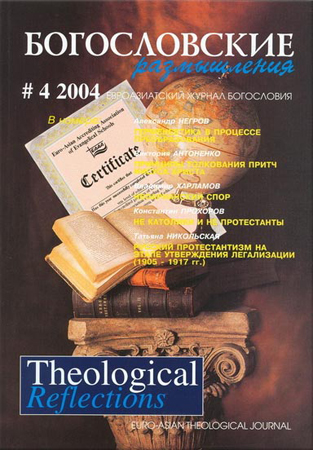Neo-Arian Controversy: The Trinitarian Theology of Eunomius
Keywords:
Neo-Arian Controversy, The Trinitarian Theology of Eunomius, Trinitarian theology of Eunomius, Eunomius, Trinitarian doctrine, Basil of Caesarea and Gregory of NyssaAbstract
This article provides a concise assessment of the Trinitarian theology of Eunomius (d. 394). Eunomius was one of the most influential leaders of the neo-Arian group active in the second half of the fourth century. In Eunomius we find a very intricate and philosophically oriented system that attempted to offer a rational and coherent explanation of the Trinitarian doctrine. He was an eloquent and original thinker. A number of Christian Fathers, including Basil of Caesarea and Gregory of Nyssa, refuted his teaching. Generally, the theology and works of Eunomius are not known to the Russian reading audience, except for some references to him in now outdated publications of the late nineteenth and early twentieth century.References
- Primary Works
- Basil of Caesarea. Quibus Impii Eunomii Apologeticas Evertitur 1-3 (Adversus Eunomium). In Patrologiae Cursus Completus, seu Bibliotheca Universalis, Integra, Uniformis, Commoda, Oeconomica Omnium SS. Patrum, Doctorum, Scriptorumque Ecclesisticorum, Series Graeca [PG], ed. J. P. Migne, vol. 29, 498-672. Petit-Montrouge, 1857.
- Eunomius. Apologeticus: PG 30: 835-68.
- __________. The Extant Works. Text and translation by Richard Paul Vaggione. Oxford: At the Clarendon Press, 1987.
- Gregory of Nyssa. Agains Eunomius. In A Select Library of Nicene and Post-Nicene Fathers of the Christian Church. Grand Rapids, vol. 5, 33-249, Grand Rapids,Mich.: Eerdmans Publishing Company, 1892 (reprinted 1983).
- __________. Answer to Eunomius’ Second Book. In ibid., 250-315.
- Secondary Works
- Books
- Cavalcanti, Elena. Studi eunomiani. Rome: Pont. Inst. Orientalium Studiorum, 1976.
- Hanson, R. P. C. The Search for the Christian Doctrine of God: The Arian Controversy 318-381. Edinburgh: T & T Clark, 1988.
- Kopecek, T. A. History of Neo-Arianism. Patristic Monograph Series, No. 8. 2 vols. Cambridge, MA: The Philadelphia Patristic Foundation, Ltd., 1979.
- Prestige, George Leonard. God in Patristic Thought. London: SPCK, 1959.
- Articles
- Abramowski, Luise. “Ein unbekkanntes Zitat aus Contra Eunomium des Theodor von Mopsuestia.” Le Muséon 71 (1958): 97-104.
- Anastos, Milton V. “Basil’s Katav Eujnomivou: A Critical Analysis.” In Basil of Caesarea: Christian, Humanist, Ascetic (A Sixteen-Hundredth Anniversary Symposium), ed. Paul Fedwick, 67-136. Toronto: Pontifical Institute of Mediaeval Studies, 1981.
- Balas, D. L. “Eternity and Time in Gregory of Nyssa’s Contra Eunomium.” In Gregorvon Nyssa und die Philosophie, ed. H. Dörrie, Margarete Altenburger and U. Schramm, 1976, 128-53.
- __________. “The Unity of Human Nature in Basil’s and Gregory of Nyssa’s Polemics against Eunomius.” Studia Patristica 14 (1976): 275-279.
- Bardy, Gustave. “L’Héritage Littéraire D’Aetius.” Revue d’Histoire Ecclésiastique 24 (1928): 809-27.
- Barnes, Michel R. “The Background and Use of Eunomius’ Causal Language.” In Arianism After Arius: Essays on the Development of the Fourth Century Trinitarian Conflicts, eds. Michel R. Barnes and Daniel H. Williams, 217-36. Edinburgh, Scotland: T & T Clark, 1993.
- Benito Duran, Angel. “El nominalismo arriano y la filosofia cristiana; Eunomio y san Basilio.” Augustinus 5 (1960): 207-26.
- Daniélou, Jean. “Eunome l’Arien et l’exégèse néo-platonicienne du Cratyle.” Revue des Etudes Grecques 69 (1956): 412-32.
- Esbroeck, M. “Amphiloque d’Iconium et Eunome, l’homélie CPG 3238.”
- Augustinianum 21 (1981): 517-539.
- Harl, Marguerite. “À propos d’un passage du Contre Eunome de Grégoire de Nysse: ajpovrroia et les titles du Christ en théologie trinitaire.” Recherches de Science Religieuse 55, no. 2 (1967): 217-26.
- Keith, Graham A. “Our Knowledge of God: The Relevance of The Debate Between Eunomius and The Cappadocians.” Tyndale Bulletin 41 (May 1990): 60-88.
- Koster, W. J. W. “De Arii et Eunomii sotadeis.” Mnemosyne 16 (1963): 135-41.
- Manis, Andrew M. “The Principle of lex orandi lex credendi in Basil’s Anti-Arian Struggle.” The Patristic and Byzantine Review 5, no.1 (1986): 33-47.
- Meredith, Anthony. “Ascetism: Christian and Greek.” The Journal of Theological Studies 27 (October 1976): 313-32.
- __________. “Traditional Apologetic in the Contra Eunomium of Gregory of Nyssa.” Studia Patristica 14 (1976): 315-19.
- Vanderbusche, E. “La part de la dialéctique dans la théologie d’Eunomius ‘le technoloque’.” Revue d’Histoire Ecclésiastique 40 (1944-45): 47-72.
- Venema, Cornelis P. “Gregory of Nyssa on the Trinity.” Mid-America Journal of Theology 8 (1992): 72-94.
- Wickham, L. R. “Date of Eunomius’ Apology: a Reconsideration.” The Journal of Theological Studies 20 (1969): 231-40.
- __________. “The Syntagmation of Aetius, the Anomoean.” The Journal of Theological Studies 19 (1968): 532-69.
- Dissertations
- Barmann, Bernard. “The Cappadocian Triumph Over Arianism.” Ph.D. diss., Stanford University, 1966.
- Dams, Th. “La Controverse Eunoméenne.” Ph.D. diss., Institut Catholique de Paris, 1951.
- Vaggione, Richard Paul. “Aspects of Faith in the Eunomian Controversy.” Ph.D. diss., Oxford University, 1976.
Downloads
How to Cite
Issue
Section
License
Copyright (c) 2020 Vladimir KНARLAMOV

This work is licensed under a Creative Commons Attribution-NonCommercial 4.0 International License.
All articles published in the Journal are distributed under a Creative Commons Attribution-NonCommercial 4.0 International License
By submitting an article for publication in Theological Reflections: Eastern European Journal of Theology the author grants the editors the right to publish the article and distribute it in electronic and print form.
The author reserves all copyrights and the right to use the materials of the article in whole or in part for educational purposes, to write his own dissertations, to prepare abstracts, conference reports, oral presentations, etc., as well as post electronic copies of articles (including the final electronic version downloaded from the journal’s official website) on non-commercial web-resources without the consent of the editorial board and founders.



